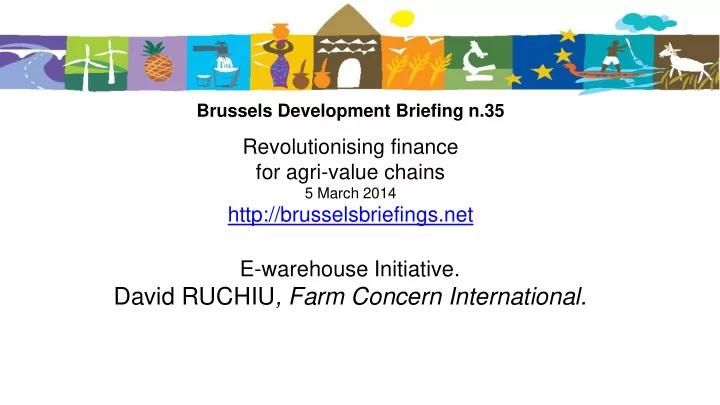

Brussels Development Briefing n.35 Revolutionising finance for agri-value chains 5 March 2014 http://brusselsbriefings.net E-warehouse Initiative. David RUCHIU , Farm Concern International.
E-warehouse Initiative Farm Concern International David Ruchiu Africa Director, Farm Concern International
Far arm Conc ncer ern n Int nter erna nation ional al, FC FCI. GROUP UP FCI wins markets for Africa for economic development and business partnerships FCI models are benchmarked to private sector approaches to enhance smallholder competitiveness FCI models adapted to addressing global dynamics (changing trade patterns, climate change and changing policies) FCI promotes technologies and innovations that enhance smallholder competitiveness and resilience FCI is partnership oriented organization FCI responds to food security, nutrition security and Income growth
FCI Mission & Vision Our Mission T o build and Implement innovative pro- poor market and Business Models that catalyse solutions for smallholder commercialization and Competitiveness in the value networks for household economic growth and Community empowerment in Africa and Beyond Our Vision Commercialized smallholder Communities with increased incomes for improved, stabilized and sustainable livelihoods in Africa and Beyond
FCI Regions & Countries
FCI Programmes
Efficiencies in out-sourcing / marketing systems through of CV model Commercial Producer Groups (CPGs) within Commercial Villages Wholesale market 200 Km • Organized based basket of value chains • Structured governance • Business partnership with buyers • Focus is village collective action • Information exchange platform established
E-warehouse Initiative
Why eWarehouse? • Smallholder farmers are often isolated from markets and lack access to financial services that would allow them to smooth their income • Lack of appropriate financing for smallholder farmers. Only 17.6% of those living in rural areas have access to formal financial services, and many of the financing options available to farmers are not well- suited to their needs and farming cycles. • At harvest time, when prices are lowest due to excess supply, most smallholder grain farmers cannot afford to wait for optimal prices before selling to buyers • Large grain warehouses are not generally available to smallholder farmers, and many risk losing their entire crop yields by not following proper storage practices
eWarehouse purpose eWarehouse intervention seeks to address ; • Identified market gaps through an integrated and mobile- enabled system • Designed to support smallholder farmers to properly store and manage their grain post-harvest and virtually bulk grain during harvest time, • Facilitate linkage to financial services to provide partial advances against the value of the stored grain • Link smallholders with markets when prices increase.
e-warehouse Strategic Objectives • Enable farmers to collectively store and sell grains at higher prices through use and development of appropriate technology; • Utilize technology and information as collateral by smallholder farmers. • Increase the value retained by smallholder farmers for their crop by facilitating access to mobile financial services • Enhanced market access for smallholder farmers • Leverage on technology as the basis of increasing efficiency in payment processes • Leverage on technology to provide actionable agronomic and market information to farmers; • Build capacity of smallholder farmers in proper post-harvest storage practices to minimize risk of post-harvest waste
Background and Grain /Pulse Trends • Low prices during harvesting for grain and pulses • Post harvest losses of up to 50% • A very vibrant mobile telephony sector • Existing Business Model- Commercial Village Model Source: GRIPS Policy Research Center, 2010
10 0 Yea ear Pr Producti duction on tren end d for Mai aize e an and d Bea eans ns 6000000 5000000 Kenya Production (MT) 4000000 Maize 3000000 Beans, dry 2000000 Tanzania Maize 1000000 Beans, dry 0 2003 2004 2005 2006 2007 2008 2009 2010 2011 2012 Year SOURCE: FAOSTAT, 2013
Information and Data through Mobile Phones; E-platform GRAIN FARMERS QUANTITY AND QUALITY VERIFIED COMMERCIAL THROUGH MOBILE VILLAGE PHONE • CENTRAL DATABASE – INFORMATION ON TOTAL e- QUALITY & QUANTITY OF GRAIN STORED, WAREHOUSE • INDIVIDUAL FARMER DETAILS AND COMMERCIAL CONTRIBUTION VILLAGE VILLAGE KNOWLEDGE INFORMATION ON WORKERS (VKWs) COLLECTIVE & INDIVIDUAL AMOUNTS AND VALUE STORED IN WAREHOUSE – SHARED WITH FINANCIAL INSTITUTION ISSUE ADVANCE OF COMMERCIAL 50% ON VALUE OF VILLAGE GRAIN STORED (BASED ON FARMER’S M - FINANCIAL PREVAILING MARKET PESA PRICE) INSTITUTION Each village has a number of (household/group-level) post-harvest storage solutions community owned
Payments based on incremental value FCI with BDS PROVIDERS facilitates collection of grain and MARKET COMMERCIAL managing collective market VILLAGE transaction INFORMAL, FORMAL, INSTITUTIONS COMMERCIAL VILLAGE e- WAREHOUSE COMMERCIAL FINANCIAL VILLAGE INSTITUTIONTIONS Grain value is adjusted based on Mobile actual sale, advance & fees deducted Money = balance owed to farmers (individual transferred to their agro-wallets farmer)
E-warehouse Financial Access Market Support Grain Commercial Villages Stores Disbursement of credit to farmers Farmers biodata and Volume of stored grain Commercial Villages 19
e-warehouse Initiative Targets • Develop an integrated model (Markets, Finance, Private Sector Partnership and T echnology) • Business Model with superior features • Replicate and scale up to all over Africa and the rest of the word • Increased incomes by target household by at least 50%
VALUE PROPOSITIONS Technical Service Enhanced provision Value delivery mechanisms Enhanced New marketing efficiency Higher Reduced post- Increased value Landscapes investment Harvest Chain capacity levels losses
eWarehouse Partners • Financial Institution • Government Agencies • Mobile Communication Service provider • Grameen Foundation • Input companies • Grain buyers • Commercial Villages
Vi Village llage Kno nowledge wledge Work orker ers (VK VKW) W) • Trained on production, commercialization & market development • Offer onsite Technical support to Commercial Villages • Equipped with training Kits – Mobile platforms, Moisture metres, Aflatoxin kits etc
Commercial Village Stores
One e on on One e Suppor ort! t!
FOR MORE INFORMATION VISIT www.farmconcern.org Winning Markets for the Poor!
Recommend
More recommend